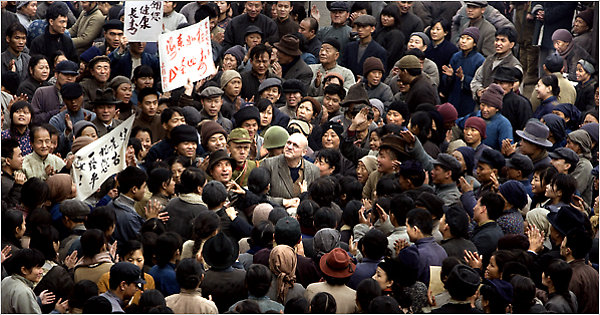|
Reviews of Recent Independent, Foreign, & Documentary Films in Theaters and DVD/Home Video

JOHN RABE John Rabe is a portrait of extraordinary heroism in an unlikely person, place, and time—Nanking, China, in December 1937. Rabe (Ulrich Tukur) is introduced first as a loyal Siemens corporate manager living the high colonial life overseas. A loyal, bespectacled National Socialist Party member, he admires Hitler, but he slowly picks up hints that his benign view of his compatriots and their Japanese allies is too rosy. About to return to Germany, Rabe hands over his office to his martinet replacement, who promptly announces he is charged with shutting down the company’s huge plant. Then the first Japanese bombs fall during his formal farewell dinner. As the Japanese shower the streets with flyers about their coming invasion, the diplomats and most of the foreigners in China’s northern capital flee on the last boat out. Rabe tricks his wife into joining them, but he spontaneously stays with a stalwart group that can’t bring themselves to leave their employees and charges: an abrasively cynical anti-Nazi American, Dr. Robert Wilson (Steve Buscemi, in one of his too rare dramatic roles), and the strident French head of a girls’ college, Valérie Duprès (Anne Consigny), a fictional representation of the American missionary Minnie Vautrin. They are joined by a bitter Jewish German diplomat’s son who recently fled Shanghai, Dr. Georg Rosen (Daniel Brühl). Rosen brings from Shanghai the idea of an International Committee to oversee a safety zone for civilians; the Shanghai version has been portrayed more frequently in films than Nanking’s, from Steven Spielberg’s Empire of the Sun (1987) to James Ivory’s The White Countess (2005). The group convinces Rabe that a German could most effectively negotiate with the Japanese to honor the zone, and he reluctantly takes the chairmanship to deal with the authorities. In addition to large-scale period recreations with swarms of extras, writer/director Florian Gallenberger intersperses real footage of the city, the refugees, and the opposing armies, as well as narration of excerpts from Rabe’s precise diary that were only made public 60 years later. (Some would compare Rabe’s actions and rediscovery to Oskar Schindler.) The action also shifts to the Japanese army under the brutal command of Prince Asaka Yasuhiko (Teruyuki Kagawa), uncle of Emperor Hirohito, and a fictional, sympathetic Major Ose (Arata), who tries to protest the siege and the orders to execute all the Chinese soldiers en masse. As almost a quarter-million panicked Chinese crowd into the fragile safety zone, the arbitrary boundaries are breached twice. First Dr. Wilson and then the college dean violate the foreigners’ promise to the Japanese not to shelter Chinese soldiers. The bloody scale of what has come down through history, to all but the Japanese government, as “The Rape of Nanking” becomes apparent, causing the group to attempt to save the lives of unarmed men, even though their quick humanitarian decisions lead to awful retaliation. Threats against one fictional female student just barely represent the actual onslaught of rapes and attacks against civilians. Documentaries have detailed the horrors of the atrocities that are only glimpsed here—from Christine Choy and Nancy Tong’s 1987 In the Name of the Emperor to Bill Guttentag and Dan Sturman’s Nanking (2007). Gallenberger not only had to deal with Chinese sensitivities and censorship about both violence and history in order to film there, but he also faced competition from Chuan Lu‘s government-approved epic Nanjing! Nanjing! aka City of Life and Death, though its American distribution has been stalled since screening at international festivals.
However,
Gallenberger focuses more on the mystery of altruism in the face of
staggering odds. This unusual, righteous group of foreigners were in the
eye of the storm and stood their ground, movingly and passionately
enacted here as full individuals, not as plaster saints. At one point, Rabe is
seen writing a naïve letter to Hitler documenting the extreme
actions of an ally and pleading for intervention. Ironically, it became
grist for his arrest by the Gestapo as a Chinese
collaborator after his return to Germany. Gallenberger brings deserved attention
to a forgotten “good Nazi,”
who died in obscurity and poverty, while
aiming a keen spotlight on the complexities of heroism.
Nora Lee Mandel
|

